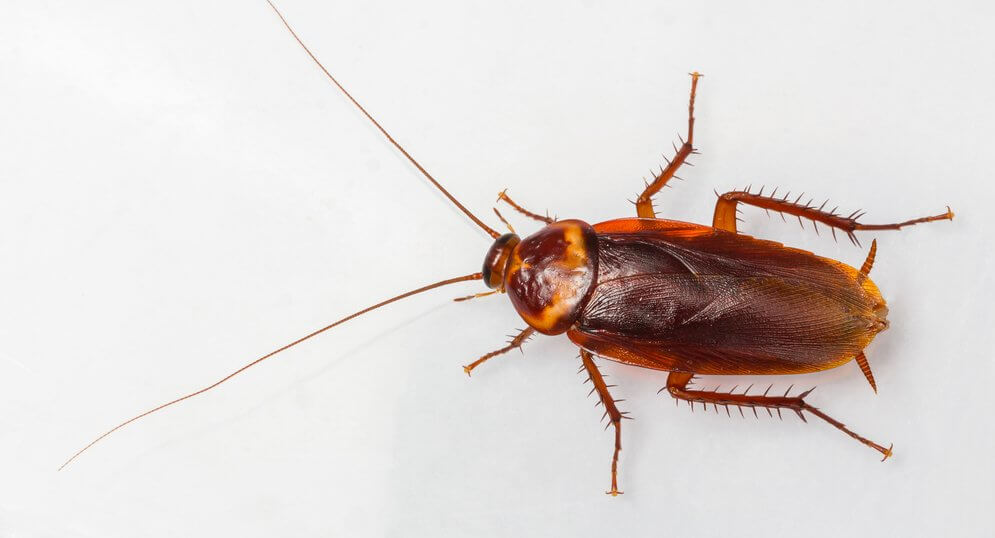
3 Things you MUST Know About Cockroaches
Cockroaches are possibly the most hated and dreaded of household pests. Their size, color, the way they scamper across the floor – everything about roaches triggers that deep-down sense of “EW!” The key to proper cockroach control is choosing the right method. If you suspect you may be in need of a roach cleanout, you should educate yourself about them beforehand.
We know that in this case “know thy enemy” is the last advice you want to hear, but knowledge is power after all! So let’s take a look at what we know about these creepy-crawlies.
Roaches Are As Old As the Dinosaurs
There are many species of insects that have been around for millennia – mosquitos for example. But roaches are possibly the oldest that still live today – they’re considered pre-historic by many entomologists (people who study insects). In fact, a perfectly preserved 100 million-year-old cockroach was discovered in a piece of fossilized amber and other fossil records indicate they’ve been around for over 300 million years.
What does this mean and why should you care? Because when things stop evolving, it’s because they don’t have to anymore – they’ve already found the perfect way to survive. And the survival of their species is a testament to how difficult it is to exterminate them. That’s why a proper roach cleanout is often a multi-step promise and best left to the professionals.
Roaches Come from Big Families
We apologize in advance for this fact. But roaches are capable of producing an alarming number of eggs. They tend to lay egg sacs that contain about 16-50 eggs each. And they can do this about once every month for ten months of the year. Some species are more prolific than others. A female German cockroach can lay more than 30,000 eggs in a year.
So the bad news is, if you see one cockroach, we can almost guarantee there are at least a dozen you haven’t seen. And because they multiply so quickly, a small problem can quickly become a large scale infestation.
Roaches Can Survive Without Food, Water… and Their Heads
While some insects need a steady food supply to thrive, cockroaches can survive for up to a month without a bite to eat. And they can go up to a week without any water! Unfortunately, this means that eliminating their food supply isn’t enough to drive them out of your home. And no matter how much you clean up, roaches will be able to eat the scraps – they’re not picky eaters! From dead insects to glue, soap, and cloth fibers, they can get nutritional value from almost anything. When the populations are large or times get tough, they’ve even been known to eat their own kind in an effort to balance the population.
They can also live for up to a week without their heads! This is possible because of their open circulatory systems and because they breathe through their bodies rather than their head. They would likely be able to live even longer sans head, but it means they have no mouth and therefore can’t eat or drink.
Roaches Can Hold Their Breath Longer Than an Olympic Swimmer
Unlike ticks, fleas, and other bothersome pests you cannot kill roaches by drowning them – so don’t drop them down the sink or try to flush them down the toilet while they’re still alive! You’d think that because they breathe through their skin (see above fact), they wouldn’t be able to survive submersion, but roaches can survive underwater for up to 30 minutes and hold their breath for almost 40! Their breathing systems are very efficient and allow them to breathe through specific body segments rather than their mouths.
This also helps them to survive in conditions that would quickly kill other animals and humans – in a gas-based chemical attack for instance. This is why over-the-counter products rarely exterminate full-fledged infestations. True roach cleanout requires specialized chemicals and techniques.
If you think you may need roach control, contact West Termite, Pest & Lawn. We’re happy to send a roach control specialist to your home to conduct a full-scale roach cleanout.
More posts from West Termite, Pest & Lawn
Holiday Travel? How to Keep Your Home Pest-Free
The holiday season in Arkansas is a time for travel, family gatherings, and festive celebrations. While you’re away, your home can become a target for pests seeking warmth, food, and shelter. From insects to rodents, even a short absence can give them a chance to...
Winter Termite Activity: Why Termites Don’t Fully Hibernate
Many homeowners assume that termites go dormant during the winter months, but in reality, these pests remain active even in cold weather. In Arkansas, winter temperatures may slow their activity, but termites continue to feed and expand colonies in protected, warm,...
Protecting Stored Firewood from Insects
Firewood is a staple in many Arkansas homes during the winter months, providing warmth and comfort. However, improperly stored firewood can become a hotspot for insects, including termites, ants, and beetles. Understanding how to protect your firewood ensures your...



